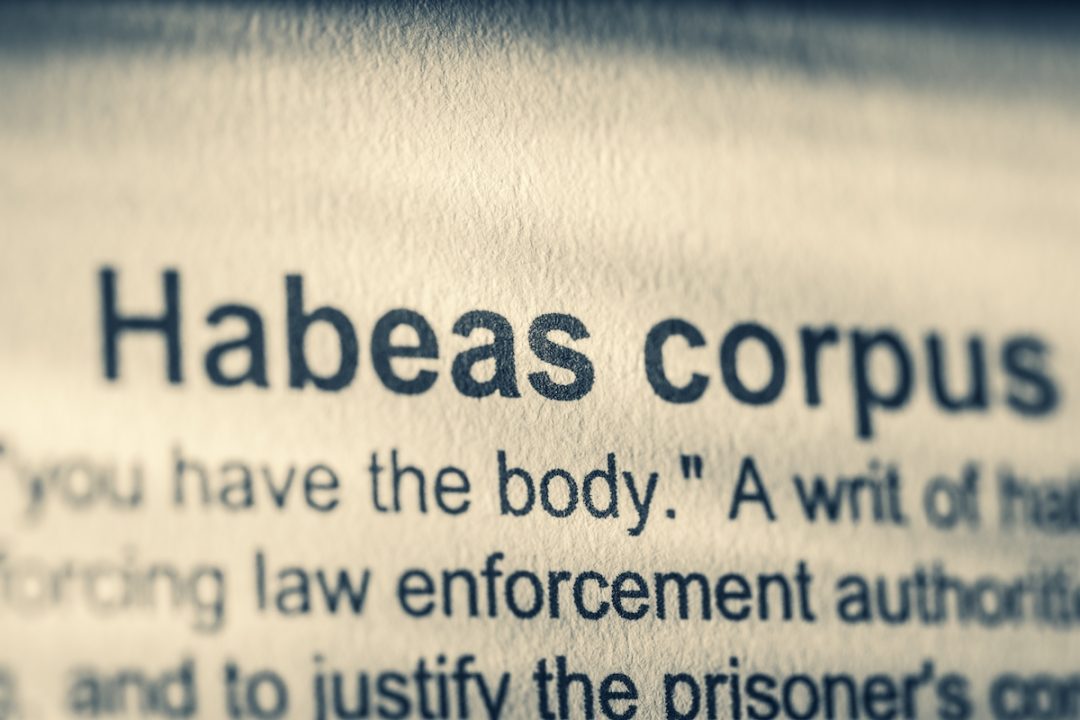
In yet another blow to the American constitutional order, Stephen Miller — the ever-earnest architect of executive tyranny in immigration policy — has now publicly pondered suspending the writ of habeas corpus for illegal aliens. His proposal amounts to nothing less than a direct assault on one of the oldest and most sacred protections of liberty known to man. It is, in fact, the juridical equivalent of targeting the keystone of the arch. Remove habeas corpus, and the structure of lawful liberty collapses.
Miller, parroting the notion that immigration constitutes an “invasion,” hopes to shoehorn a justification into the narrow constitutional exception that allows for the suspension of habeas corpus “when in Cases of Rebellion or Invasion the public Safety may require it.” But our Founders were explicit in their understanding of both terms. Invasion was understood to mean hostile armed incursion, not the arrival of migrant families seeking work. To conflate the two is not only intellectually dishonest, it is a slander upon the memory of the Framers.
The Founders’ Understanding
The writ of habeas corpus is not merely a procedural mechanism — it is the very embodiment of the rule of law against arbitrary power. Long before the ink dried on our Constitution, the common law of England enshrined this safeguard in the Magna Carta, where it declared: “No free man shall be seized or imprisoned … except by the lawful judgment of his equals or by the law of the land.” The Founders revered this principle. Blackstone exalted it as the “bulwark of individual liberty,” and Jefferson and Madison considered it a bellwether of whether a people were free or enslaved.
St. George Tucker, the great Virginian jurist and early commentator on the Constitution, wrote with piercing clarity on this very matter:
Here a question naturally occurs: if a person be illegally committed to prison in any state, under, or by colour of the authority of the United States, can any judge, or court of the state in which he is confined, award a writ of habeas corpus, for the purpose of an enquiry into the cause of his commitment? To which, I answer, that if he be committed or detained for any crime, unless it be for treason or felony, plainly expressed in the warrant of commitment, and be neither convicted thereof, nor in execution by legal process, the writ (due requisites being observed) can not be refused him.
In other words, it was universally accepted by early American jurists that habeas corpus is not a discretionary kindness but a binding obligation — even upon federal actors operating within the boundaries of a sovereign state.
Veiled Despotism
Today, Miller would undo centuries of Anglo-American legal development to create a regime where the federal government can seize a person — alien or otherwise — and deport him without judicial review. This is not immigration policy; it is despotism cloaked in bureaucracy.
And yet, the tragedy is not limited to Miller’s ambitions. There are those in the libertarian movement, infected by the collectivist distortions of Hans-Hermann Hoppe, who try to argue that strict immigration enforcement is consistent with liberty. They twist the non-aggression principle until it justifies government violence against peaceful people. They say a government may act like a homeowner removing a trespasser. But the analogy collapses under scrutiny: A government is not a homeowner. It is an agent of the people, bound by a Constitution that limits its every move.
As Anthony Gregory and Walter Block have noted, Hoppe’s logic — if taken seriously — would justify any number of tyrannical restrictions: prayer bans, gun grabs, and blue laws, all justified because “the public” allegedly wants them. That’s not liberty; that’s majoritarian totalitarianism with a fig leaf.
This is the same logic that motivated the Chinese Exclusion Act and the shameful operation of what critics derided as “habeas corpus mills” in the 19th century. Judges in California, bound by conscience and the Constitution, granted habeas petitions to Chinese immigrants facing unlawful detention and deportation. Those judges were mocked, but they were right. The law must protect even the unpopular if it is to protect anyone at all.
Habeas Corpus an Obstacle to Law Enforcement?
The moment we begin carving out classes of people for whom due process does not apply — be they immigrants, drug users, or political dissidents — we have not reformed the system, we have destroyed it. The Fourth Amendment and habeas corpus are not “obstacles” to law enforcement — they are the very essence of lawful government. If a law cannot be enforced without trampling these rights, then the law must go — not the liberty.
Yes, there are bad actors among the illegal-immigrant population. But this is also true of native-born citizens. Do we propose suspending due process for all men of a certain class because some of them committed crimes? Shall we abolish jury trials for men under 30 because statistics show they commit more homicides? The very notion is absurd — and tyrannical.
Once a nation justifies suspension of habeas corpus in pursuit of administrative expediency, it has left the harbor of liberty and set sail on despotic seas. Stephen Miller is no student of Western legal tradition; he is a saboteur of it. His proposal is not a policy debate — it is a declaration of war on the Constitution.
The United States is a republic, not a police state. Our Founding Fathers gave us a charter of liberty, not a license for Leviathan to chase down every brown-skinned stranger with a clipboard and a plane ticket.
If we wish to remain free, we must defend habeas corpus — not only for those we like, but especially for those we don’t. For history teaches us this: Once government gets a taste for unchecked power, it is not long before the net tightens around us all.




